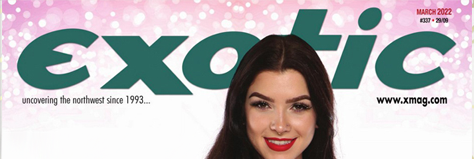

Okay, yes, Portland does have a scene. But, what is the scene bringing to the national table, let alone the global one? Sure, stuff’s happening here, but is it anything worth exporting? What new sound is coming out of Portland that’s making snarky journalists from NME fly over here to coin a brutally scathing yet accurate term for it? Currently, none, but maybe we can change that. Right here, right now, in this magazine, you picked up in a sex toy shop!
It’s not hard. At this point, people are pulling generic genre adjectives and gluing them together. Just throw "core" or "post" onto literally any word, and you have a new genre. Why is every Portland band trying to be the next Elliott Smith or Modest Mouse when we could start throwing darts at a dictionary. The following are just a few ideas that I feel our wet, little, wooded city is already primed to make reality. The ingredients are there. We just need to put them in the oven and commit. So, all you song slingers out there reading this—chew on these and see if you can spit anything out.
You may think I’m being derogative and offering this niche genre as an excuse to use some flippant pejorative to describe a softboi with a Jazzmaster and too many pedals, whose personality-defining trauma is that the cute goth girl he has a crush on won’t fuck him. You’re absolutely right. However, the term "shoegaze" was coined for exactly the same reason! Except for the poor, noisy UK bands from the late ‘80s only sin to earn this vicious branding was simply looking at their array of effects pedals. Still, that doesn’t change the fact that the snarky NME journalist meant it as an insult. Of course, now we have offshoots such as metalgaze, blackgaze, and last year, I read about a new group described as jazzgaze. The term was reclaimed. I guarantee the same thing would happen to this new, PDX-born-and-bred genre (that, yes, would be yet another offshoot of shoegaze). We have enough thirsty, single, penis-owning songwriters to congeal their thinly-veiled misogyny into a cohesive sound. Lyrical content is just rearranged set pieces of Bob Dylan’s "Like A Rolling Stone." Performative poor boys whining about attractive, popular women, who they resent for not touching their weiner. Fight me, boomers.
Stay with me. You see, depie is short for dependent, just like indie is short for independent. See? Depie rock! Fuck DIY. Fuck small record labels. Fuck cassette tapes no one can play and fuck shows in basements. Let’s start a new trend of Dependent Rock! Just as there is literally nothing independent about the bands that describe themselves as indie, eventually, depie will also lose its capitalistic and money-hungry roots. However, the mood of demanding some sort of compensation for one’s musical effort should permeate the sound. That vibe of only taking the paying gigs and catering to major labels with a non-offensive sound that your grandma can listen to. It could be a thing. Come on, Portland!
Here’s the thing. The existence of pop and the existence of hyperpop suggests the existence of superpop. We can’t just skip a goddamn step in the trajectory. How do we know hyperpop is even feasible if we haven’t achieved superpop? Leave it to Portland to take it down a notch. I have no idea what superpop sounds like. One would think this is the ultimate form of pop on a Shania Twain/Michael Jackson level. However, based on the designation we’re giving nuclear-capable missiles that we’re lobbing at each other from across the globe, hyper exceeds super. We jumped a level in pop, and that just seems wrong. Come on, Portland. Only you can give us 10 to 50 gecs, or thereabouts.
One of the cool things about splitting hairs with microgenres is sometimes you can just invent a new one by being contrarian. In the early ‘80s, even Sonic Youth embraced the concept of "No Wave." As in, "Oh, New Wave? Actually, we’re not that; we’re No Wave." Once again, with the thought experiments—if we can have chillwave, we can also have nochillwave. Portland is the perfect breeding ground for this kind of anti-genre. We are flooded with hipster douchebags obsessed with VHS tape nostalgia, so we have the authentic love of chillwave to mirror off of. All we need to do is flip it on its head. Instead of smooth, synthy trips through an idyllic eighties dreamscape, imagine the broken, jittery nightmare of a post-Reagen hellscape. Just as chillwave celebrated the nostalgic veneer of the eighties, nochillwave can expose the brown, broken, cracked reality that it actually was. How this can be musically achieved is up to Portland’s finest. Throw a dollar to your dancer and get on it.
Despite the name, this genre has nothing to do with punk but everything to do with where the folks who like said genre live. The squats! This new genre is actually a response to the bedroom pop phenomenon that has imploded, thanks to the plague assist. Granted, any kind of music can be made in your bedroom, but the isolation and privacy do have an effect on the resulting product. With a laptop, Pro Tools, and your imagination, you could literally make anything—but the fact that you’re alone in a room where you sleep will shape the kind of stuff you make. Let’s apply that same environmental effect on those folks who have to couch surf to get by. They don’t get to close the door. They’re just there on the couch in the living room while six other unwashed dudes are playing beer pong, smoking cigarettes, and watching Futurama. That quiet, close intimacy will be replaced with random tangents and ambient noise. It could be a thing, and it could be a distinctly Portland thing.